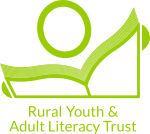The different types of literacy. Understanding the difference is important.
Functional Literacy and ESOL Literacy
There is a place in schools for two functions, English language teaching and English literature teaching. And that is being eroded somewhat by the philosophy that English need not be a subject. However, in the adult literacy world, there are two different strands:
- Functional Literacy, which is what the Rural Youth and Adult Literacy Trust promote.
- ESOL Literacy is what organisations like English Language Partners do.
We also do critical literacy alongside functional literacy. We can do this by using student centred and student-directed literacy teaching methods. In the functional literacy area, specific teaching of grammar creates a barrier.
Remove the fear
Students have had their fill of teachers and school methods. We need to remove the fear, and a part of that is not using grammatical jargon and not correcting the student. Most students come with their own internalised grammar, and we honour that student voice by not correcting it.
Instead, we teach them to read and write so that their voice can be heard. On the rare occasions that a student asks to be taught grammar, we will jump to teach grammar because that is part of being student-directed. Even then, however, there is often no need to use grammar jargon. Most of the time, using language such as ‘doing words, word beginnings, word endings, prefixes, suffixes, joining words and syllables’ is all we need.
We combine that with questions such as ‘does it sound right?’, ‘Does it sound the way you want it to sound?’ and exercises such as text analysis of admired – by the student – writing samples. If the student makes a particular grammar error, we will find it in Raymond Murphy’s grammar books and use the explanations and exercises as practice activities.
Raymond Murphy’s grammar books are excellent at demystifying grammar, however we use them with caution.
Find out more on the excellent return that you get from investing in literacy here.



